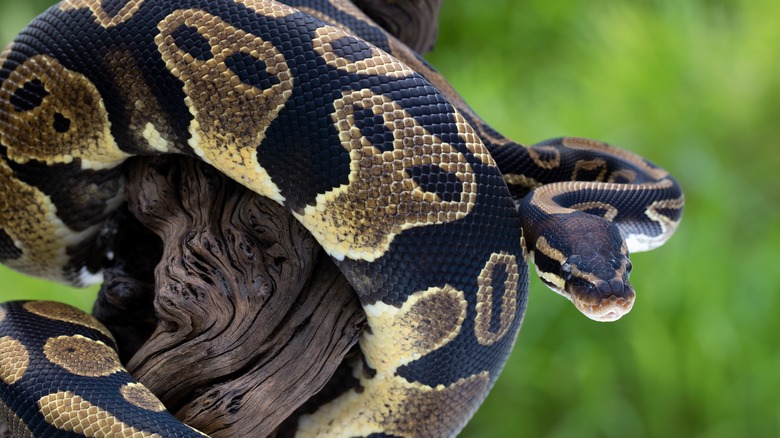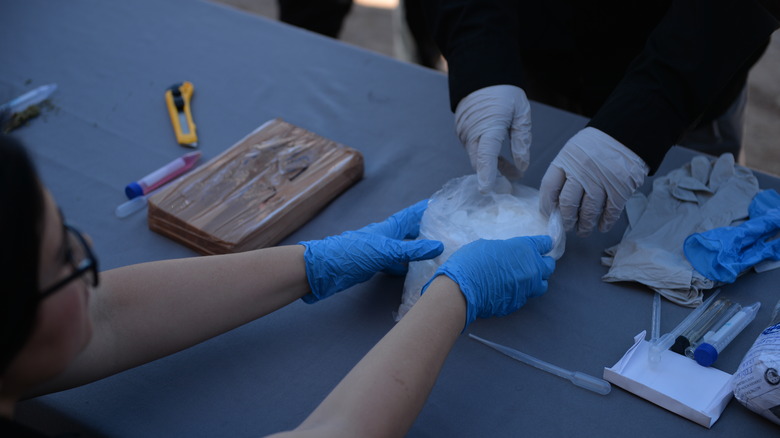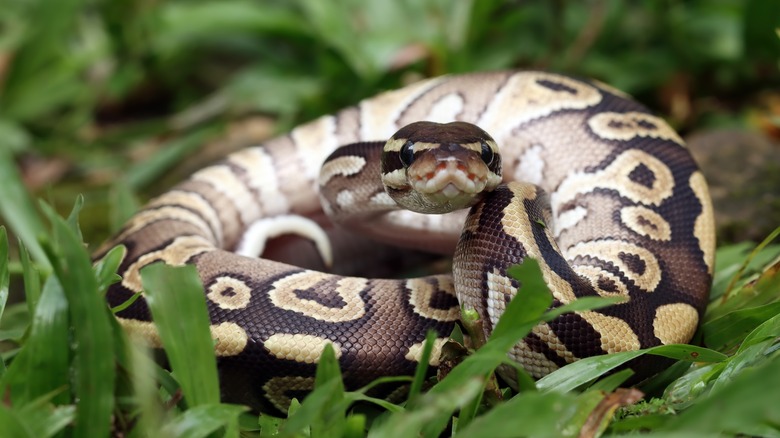The Real-Life Story About The Snake With A Drug Addiction And The Prisoners That Saved It
Pythons are a nonvenomous reptile found slinking through jungles across the world in regions like Africa, Asia, and Australia (via San Diego Zoo Wildlife Explorers). Growing up to a whopping 33 feet long and the heaviest weighing in at about 250 pounds, these skilled killers target their prey slowly, moving at just about 1 mile per hour. Then, they narrow in on their prey using otherworldly heat-sensing abilities. After the target is set, they ambush and squeeze their captive to death, "constricting" them (hence the classification, "constrictor").
So, we've learned that pythons can sense heat, but they can actually sense cold too ... ice, to be precise. You might be wondering, where would a python find ice in the jungle? Especially considering freezing temperatures are deadly to them (via NPR). But you know what else is deadly to pythons? Methamphetamine. And this python didn't find it in the jungle. It also didn't move very slowly after consuming it.
The Rescue
Back in 2017, Australian police raided a crystal methamphetamine lab, where, in lieu of heaps of drugs and chemistry equipment, they found a peculiar user of the drug — a 6-foot-long python exhibiting signs of heightened aggression (via BBC). Described as jittery and on edge, what was usually a somewhat docile and slow-moving specimen was looking to attack and showing increased hostility (via Yahoo News Australia).
The unlikely drug user was taken in by unlikely heroes as a patient at the minimum-security John Morony Correctional Complex in Windsor. This snake wasn't locked up for its crimes, though (or rather, the crimes committed against it). Instead, it was rehabilitated in the Corrective Services NSW Wildlife Care Center, where prisoners care for and save local wildlife, like snakes, wombats, opossums, kangaroos, and more. But you know that old bumper sticker plastered across pet-lovers' cars that so often reads "Who rescued who?" Well, the same concept goes for these saviors and their animal companions.
If you or anyone you know is struggling with addiction issues, help is available. Visit the Substance Abuse and Mental Health Services Administration website or contact SAMHSA's National Helpline at 1-800-662-HELP (4357).
The Rehabilitation
According to prison governor Ivan Calder, the wildlife program is not meant to only save and rehabilitate animals but the inmates as well. In an interview with BBC, he said the program "softens" and "humanizes" the men. Calder claimed that giving them the opportunity to care for the animals is "a major enabler in their rehabilitation and major agent for behavior change." In an interview with Yahoo News Australia, an inmate involved with the program, Minas Kassiotis, said the work "makes me proud to know that I am repaying my debt to society by doing something to sustain our wildlife."
Pythons and other unlucky animal victims are often kept by criminals to defend hidden stashes of guns and drugs. Sadly, the facility is no stranger to these sorts of situations, with nearly 250 animals being cared for at the time of this story. But, if all the evidence for positive change created by this program doesn't warm your heart enough, know that after seven months in rehab, the python was doing well and placed in a home with certified handlers (via Yahoo News Australia).


